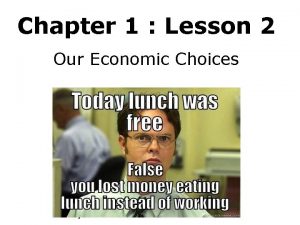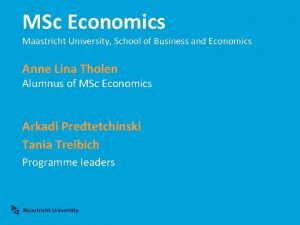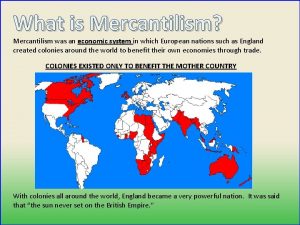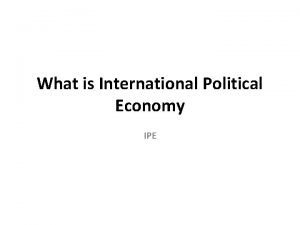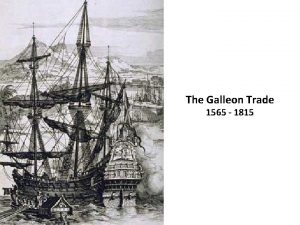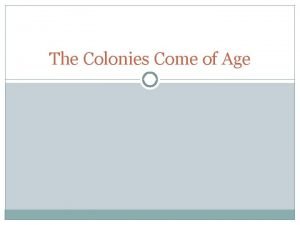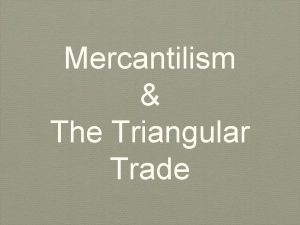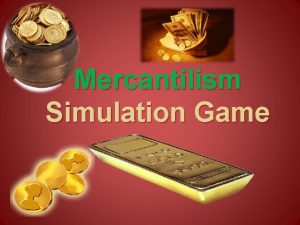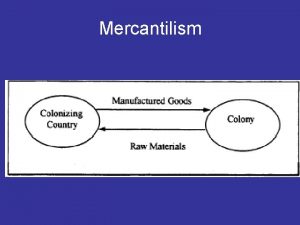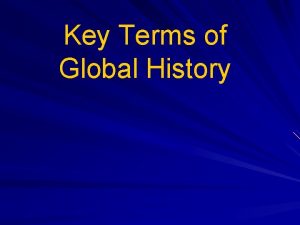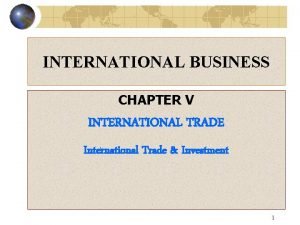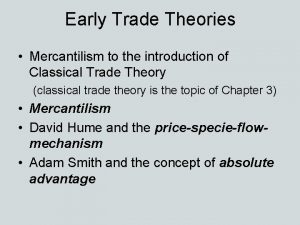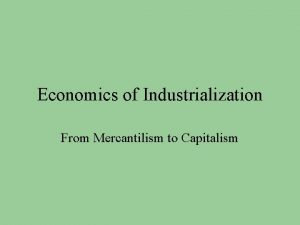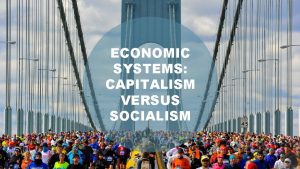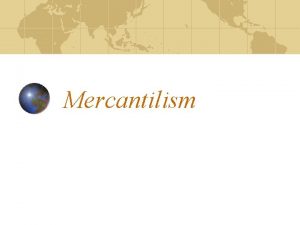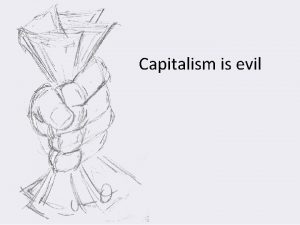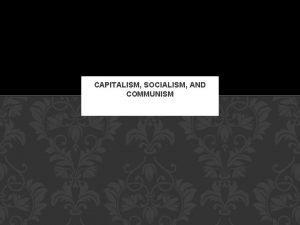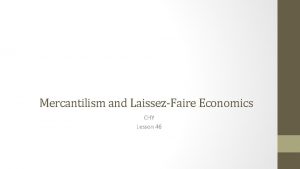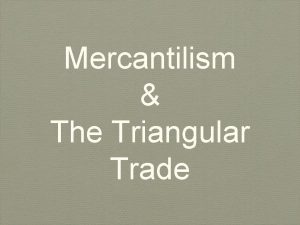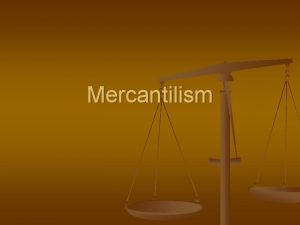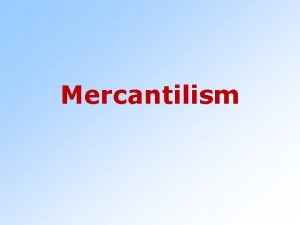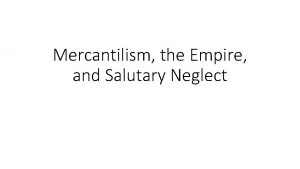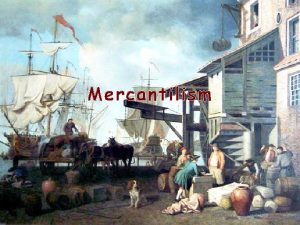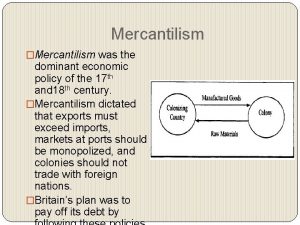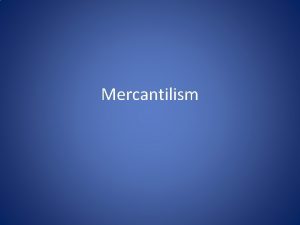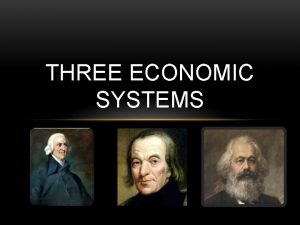Economic Systems Mercantilism to Capitalism Economic Systems Economics

















- Slides: 17

Economic Systems: Mercantilism to Capitalism

Economic Systems • Economics is the study of the production, distribution, and consumption of goods and services • An economic system is an organized model for making decisions about the distribution of resources.

What values underlie capitalism? • Salve lucrum! Lucrum gaudium! • “Hail profit! Profit is joy!”

Capitalism • Capitalism is the foundation of modern economic globalization • Values: - Competition - economic freedom - personal responsibility - consumerism - individualism

Capitalism • Capitalism refers to an economic system in which the means of production are privately owned and operated for profit, and are determined through the operation of a market economy.

Adam Smith (1723 -1790) • The Wealth of Nations, provided one of the bestknown intellectual rationales for free trade and capitalism. • Self-interest alone can lead to socially beneficial results. Ie. The invisible hand.

Adam Smith – Father of Capitalism • Laissez Faire “hands -off” • Survival of the fittest • Wealth of Nations • Critic of mercantilism. Why? • Individualism and Competition should be embraced.

Key Ideas Behind Capitalism 1) Individual initiative and the desire for profit motivate people to work. 2) People compete for their own self interest. 3) Individuals have the right to own property and to accumulate wealth. 4) Production and ownership of the goods of a country should be in the hands of private individuals and companies.

Four Keys to Capitalism • Profit motive – should be the desire for people to work hard • Competition promotes self interest • Private ownership of property and development • Production and distribution of goods should lay in the hands of individual not government

Flaws in Capitalism • Who pushed for laws supporting capitalism? • What are some alternative economic system to capitalism? • What countries or figures are linked to these systems?

Planned Economy North Korea Mixed Economy Canada Market Economy USA Planned Economy Mixed Economy Market Economy Resources owned by the government Government decides what to produce and how to use resources Consumer has little influence on economic decision making No private ownership of businesses or property Some resources publically owned and some are privately owned Both government and individuals make economic decisions Government may own some businesses and property Individuals can own businesses and property Resources privately owned Businesses privately owned Property privately owned Consumers decided what is to be produced No government involvement

The Factors of Production • Factors of production are important to a country and an economy because all three combined show rich or poor a country may be. The Industrial Revolution started in Great Britain because they had the availability of land, labour and capital in great numbers The basic resources of an economy are: • Land • Labour • Capital

• Land – is defined as the usual gifts of nature, such as farmland, mines, forests, rivers, lakes, natural resources and space to develop • Labour – the workers, especially manual workers, in a country, company, or industry considered as a group • Capital – material wealth in the form of money or property

Alternative Economic Systems • Communism: an economic system in which all people work for government-owned and run enterprises. • Communistic theory suggests that the government should act as a protector to its citizens to avoid exploitation (the use of a person or group for selfish purposes).

Karl Marx • Marx believed that capitalism would be displaced by radical socialism which in turn would develop into a communism - a classless society. • The Communist Manifesto

John Stuart Mill (1806 -1873) • Although Mill believed in free markets, he also believed that government should enact laws to protect workers.

Communism in Practice • Communist countries: – Russia – China – Cuba • For the Chinese “Jumping into the sea” is an expression that means leaving a safe, government job for high-paying but risky one. • Many experts believe communism has failed, why do you think this is so?
 Mercantilism vs capitalism
Mercantilism vs capitalism Mercantilism vs capitalism
Mercantilism vs capitalism Capitalism economic system
Capitalism economic system Economic systems lesson 2 our economic choices
Economic systems lesson 2 our economic choices Maastricht university school of business and economics
Maastricht university school of business and economics Econ213
Econ213 How did mercantilism work
How did mercantilism work Relational power
Relational power Galleon trade meaning
Galleon trade meaning British mercantilism
British mercantilism Mercantilism theory of international trade
Mercantilism theory of international trade The bostonians paying the excise-man explained
The bostonians paying the excise-man explained Mercantilism simulation game
Mercantilism simulation game Mercantilism theory
Mercantilism theory Secular religion
Secular religion How mercantilism works
How mercantilism works Mercantilist theory
Mercantilist theory How mercantilism works
How mercantilism works



